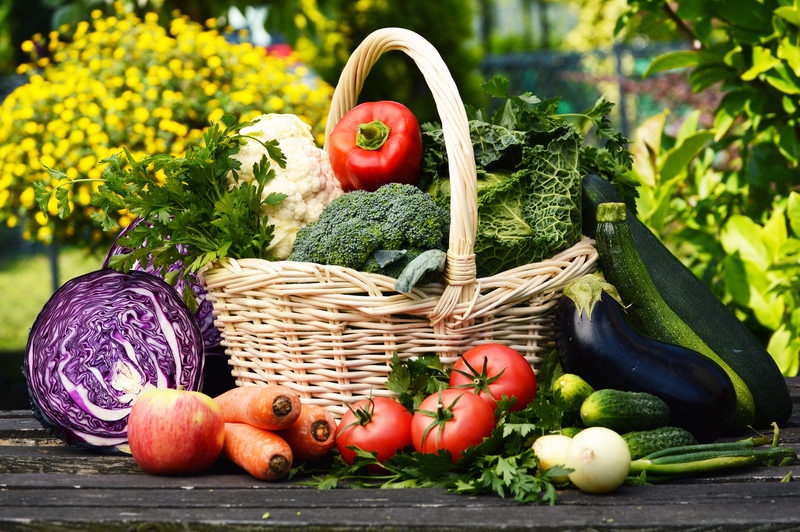From Discard to Fertility: Recycling Organic Waste in Soil
Posted on 12/09/2025
From Discard to Fertility: Recycling Organic Waste in Soil
Transforming organic waste isn't just an environmentally conscious act--it's the key to unlocking richer, more fertile soils. As communities seek sustainable solutions to food waste and urban organic debris, recycling organic waste into soil emerges as a crucial ally for gardeners, farmers, and city planners. In this comprehensive guide, we explore the journey of organic waste as it transitions from discard to soil fertility, highlighting methods, benefits, challenges, and actionable tips for eco-friendly soil enhancement.
Understanding Organic Waste and Its Soil-Building Potential
Before exploring recycling organic waste in soil, it's vital to understand what constitutes organic waste. This waste encompasses everything that once lived and is biodegradable. With the right processes, these discards can feed the earth instead of landfills.
What is Organic Waste?
- Food scraps: Peelings, fruit cores, vegetable ends, coffee grounds, eggshells.
- Yard debris: Grass clippings, fallen leaves, branches, plant trimmings.
- Other organics: Paper towels, natural fibers, some compostable packaging.
*Organic waste is distinct from inorganic waste, which cannot be broken down naturally. When ignored or mishandled, organic waste is a major contributor to methane emissions in landfills. But, when recycled into soil, these discards become valuable resources for enriching the earth.*

Why Recycling Organic Waste in Soil Matters
Turning food scraps and garden waste into soil amendments comes with vast ecological and economic benefits. The practice, often called organic waste composting or soil amendment recycling, not only reduces environmental pollution but also revitalizes soil health for generations.
Key Benefits of Recycling Organic Waste in Soil:
- Reduces landfill use: Landfills are overwhelmed by biodegradable matter that could be composted.
- Lowers greenhouse gas emissions: Composting prevents methane release, curbing climate impact.
- Improves soil fertility: Compost and decomposed organics enrich soils with essential nutrients.
- Enhances soil structure: Organic matter improves aeration, water retention, and root development.
- Supports biodiversity: Healthy soils foster robust microbial and earthworm communities.
- Reduces chemical use: Compost naturally improves plant health, decreasing reliance on synthetic fertilizers.
How Does Organic Waste Become Fertile Soil?
The transformation from organic discard to fertility is a testament to nature's ability to recycle efficiently. This process hinges on decomposer organisms that break down complex organic materials into simpler, soil-enriching forms.
The Composting Process Explained
Composting is the controlled breakdown of organic waste to create a stable, rich soil amendment. The recipe for effective composting is:
- Carbon-rich materials (browns): Dried leaves, twigs, cardboard, straw.
- Nitrogen-rich materials (greens): Fresh grass clippings, fruit & vegetable scraps, coffee grounds.
- Water: Essential to maintain microbial activity, keeping the heap moist but not soggy.
- Oxygen: Aeration is vital; regular turning enables beneficial organisms to thrive.
Over weeks to months, bacteria, fungi, and invertebrates break down these inputs, generating heat and producing humus--the dark, crumbly, nutrient-packed substance that brings remarkable soil fertility.
Other Methods of Recycling Organic Waste in Soil
- Vermicomposting: Using earthworms (typically red wigglers) to convert organic waste into worm castings, an exceptionally fertile byproduct.
- Bokashi fermentation: An anaerobic method using beneficial microbes to pre-ferment kitchen waste before burying it in soil.
- Mulching: Directly spreading leaves, grass, or shredded plant matter around plants to slowly decompose and feed soil organisms.
- Direct incorporation: Digging food scraps or green waste into garden beds, allowing soil microbes to break it down in situ.
Best Practices for Recycling Organic Waste in Soil
For effective recycling of organic waste in soil, consider these science-backed strategies:
Building the Optimal Compost Pile
- Balance greens and browns: Aim for a carbon-to-nitrogen ratio of about 30:1.
- Size matters: A pile at least 3ft x 3ft x 3ft retains heat, accelerating decomposition.
- Keep it moist: Like a wrung-out sponge; water as needed, especially in dry conditions.
- Turn regularly: Aerate every 1-2 weeks to supply oxygen and speed up breakdown.
- Monitor temperature: Active compost should reach 130-160?F (55-70?C) for pathogen kill-off.
What to Compost and What to Avoid
Excellent for Composting:- Vegetable and fruit scraps
- Grass clippings (in thin layers)
- Coffee grounds and paper filters
- Eggshells
- Tea bags (without synthetic mesh)
- Leaves, straw, wood chips
- Sawdust from untreated wood
- Dairy, meat, and oily foods (attract pests, slow down composting)
- Diseased plants or weeds with seeds
- Pet waste
- Coal or charcoal ash
Integrating Organic Waste Recycling in Urban and Rural Settings
- Backyard composters: Effective for homes with gardening space; economical & scalable.
- Community composting sites: Reduce pressure on waste facilities and build social cohesion.
- Municipal organics programs: Curbside collection of food and yard waste, turned into compost for parks and agriculture.
- Farm-scale composting: Converts crop residues and livestock bedding into soil amendments, closing nutrient loops.
How Recycled Organic Waste Improves Soil Fertility
Compost and other recycled organic materials serve as the backbone of healthy, living soil. Here are the ways they elevate soil productivity and resilience:
Nutrient Enrichment
- Recycling organic waste releases nitrogen, phosphorus, potassium, calcium, magnesium, and trace minerals--underground nutrients essential for robust plant growth.
- Steady, slow-release nutrition reduces fertilizer leaching and minimizes environmental runoff.
Soil Structure Enhancement
- Incorporated organics help create stable soil aggregates, improving drainage and reducing erosion.
- Improved aeration allows plant roots to explore soil more fully, strengthening crops and turf.
Water Retention and Drought Resilience
- Compost-rich soils hold more water, reducing irrigation needs especially in sandy or arid areas.
- During heavy rains, these soils absorb more water, decreasing runoff and flooding.
Biological Activity
- Organic matter fuels healthy populations of earthworms, fungi, and beneficial bacteria, powering natural disease suppression and recycling nutrients.
pH Buffering
- Recycled organics act as a buffer, helping soil resist harmful pH swings that could otherwise hamper crop yield.
Challenges in Recycling Organic Waste in Soil
While the environmental and agricultural gains are clear, organic waste recycling does pose obstacles for some communities and individual practitioners.
- Odor and pest control: Improperly managed compost attract vermin or smells unpleasant. Proper balance and aeration address most issues.
- Contamination: Misplaced plastics, metals, or glass in the compost stream compromise quality and safety.
- Labor and space requirements: Frequent turning and pile management are necessary for small-scale composters.
- Lack of education: Many people are unaware of best practices or unwilling to participate without incentives.
- Regulatory issues: Some municipalities restrict on-site composting, especially food scraps, or impose permit requirements.
Despite these challenges, awareness and adoption of best practices are steadily increasing, led by educational campaigns, policy support, and innovative composting solutions.
Innovations in Organic Waste Recycling
- Smart composting bins: Modern bins monitor moisture, temperature, and oxygen, making home composting easier and cleaner.
- Large-scale bioconversion: Some facilities harness black soldier fly larvae or industrial-scale vermiculture to process tons of organic discards into fertilizer and animal feed quickly and safely.
- Bokashi kitchens: Compact, odorless solutions for apartment dwellers and urban environments.
- Automated sorting technology: Curbside programs now use sensors and AI to separate organic waste efficiently, reducing contamination and maximizing high-quality compost production.
How to Start Recycling Organic Waste for Soil Fertility at Home
Simple Steps for Beginners
- Collect organics: Dedicate a bin for food scraps and compostables. Add yard waste as available.
- Pick a site: Choose an outdoor spot for your pile or use a bin/worm farm for indoor recycling.
- Layer and balance: Alternate layers of 'greens' and 'browns'; keep it damp and turn often.
- Monitor progress: Finished compost should smell earthy, not sour or rotten.
- Apply generously: Spread 1-3 inches over garden beds, lawn, shrubs, or potted plants.
Tips for Successful Organic Waste Recycling
- Chop materials: Smaller pieces break down faster--chop vegetable peels and yard debris.
- Cover food scraps: Bury them under browns to minimize flies and odors.
- Keep learning: Many city and university programs offer free composting workshops.

Global Impact: From Waste Management to Soil Regeneration
Recycling organic waste in soil offers potential for massive environmental change. Globally, it's estimated that over one-third of food produced for human consumption goes to waste. If just a portion of this material is returned to the earth, we could:
- Enrich soils: Feeding the world's growing population on healthier, more productive land.
- Combat climate change: Diverting organic waste from landfills slashes methane emissions and stores carbon in the ground as stable humus.
- Empower communities: Cities and towns investing in soil recycling programs foster environmental stewardship, job creation, and local food initiatives.
Conclusion: Turning Discard into Opportunity
From your kitchen counter to global agriculture, recycling organic waste in soil is a sustainable solution with far-reaching benefits. By participating in composting and other organic waste recycling methods, everyone can help transform discards into vibrant, productive soil, contributing to a healthier planet and more resilient food systems. Whether you start a backyard bin or join a municipal program, your actions help close the loop--restoring fertility, reducing waste, and building the foundation for ecological renewal.
Embrace the journey from discard to fertility. By recycling organic waste in soil, you're not just reducing waste--you're nurturing life from the ground up.

